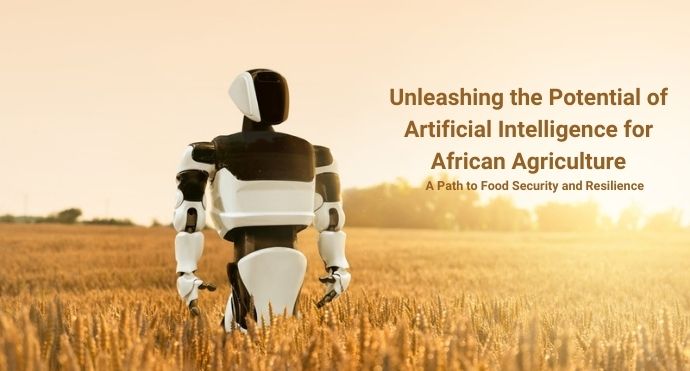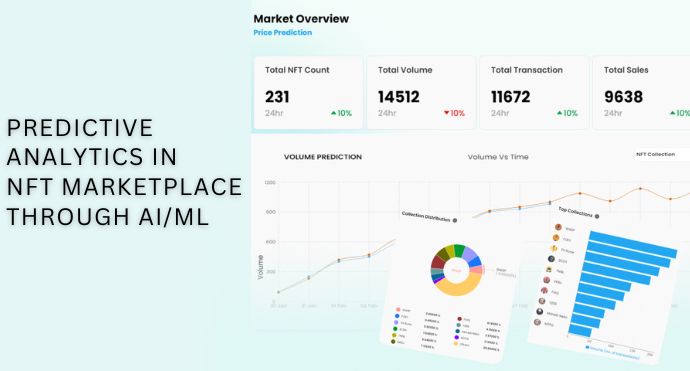Africa’s agricultural heritage is deeply rooted, but the continent faces significant challenges, including climate change, population growth, and food insecurity. In the face of these hurdles, Artificial Intelligence (AI) emerges as a transformative solution with the potential to revolutionize African agriculture. By optimizing agricultural practices and bolstering resilience, AI can play a pivotal role in ensuring food security for the continent. This blog explores the diverse ways AI can benefit African agriculture and addresses the challenges that need to be overcome to harness its full potential.
AI Empowering African Agriculture
1. Improving Crop Yields:
AI offers a data-driven approach to boost crop yields sustainably. By analyzing climatic data, soil conditions, and historical crop patterns, AI algorithms can optimize irrigation systems, precisely apply fertilizers, and predict yields. This empowers farmers to make informed decisions that result in increased productivity.
2. Managing Pests and Diseases:
AI’s ability to process vast amounts of data enables the creation of smart pest and disease management strategies. Early warning systems can be developed to detect threats promptly, and targeted treatments can be administered efficiently, reducing crop losses and minimizing the use of harmful pesticides.
3. Monitoring Soil and Water Quality:
Sustainable agriculture relies on maintaining healthy soil and water resources. AI-powered sensors and data analytics can continuously monitor soil and water quality, providing real-time insights for better land management and resource conservation.
4. Improving Livestock Management:
AI-driven technologies aid livestock management by tracking animal health, optimizing breeding practices, and enhancing feed efficiency. This results in healthier, more productive livestock and a more resilient agricultural system.
5. Facilitating Market Access:
AI can bridge the information gap for farmers, providing valuable data on market prices, demand, and logistics. By empowering farmers with market insights, they can make informed decisions about when, where, and what to sell, leading to improved incomes and livelihoods.
Unleashing the Impact of AI on African Agriculture:
The transformative impact of AI on African agriculture is profound. By leveraging AI’s capabilities to enhance crop yields, manage pests and diseases, and optimize livestock management, food production can be significantly increased, contributing to improved food security. Moreover, AI-enabled market access opens new opportunities for African farmers, promoting economic growth and sustainability.
Challenges to AI Adoption in African Agriculture:
While the potential benefits are immense, certain challenges impede the widespread adoption of AI in African agriculture:
1. Cost of AI Technology:
The initial investment in AI technology can be prohibitive, especially for small-scale farmers with limited resources. To overcome this, governments and organizations must explore cost-effective AI solutions and provide financial support to promote accessibility.
2. Lack of Data:
AI models rely on large datasets for accurate predictions and analysis. Unfortunately, Africa often faces data scarcity. Collaborative efforts are needed to collect and share data, supporting the development of robust AI models tailored to the continent’s unique agricultural landscape.
3. Skills Development:
The scarcity of AI expertise is a roadblock to its widespread implementation. Capacity-building initiatives, including training programs and partnerships with educational institutions, are essential to equip African farmers with the skills to effectively leverage AI technologies.
Conclusion:
Despite the challenges, the potential of AI to transform African agriculture is undeniable. With a concerted effort to address cost barriers, data scarcity, and skills development, Africa can unlock the full potential of AI and revolutionize its agricultural sector. By embracing AI’s capabilities to enhance food security and resilience, Africa can take strides towards a sustainable, prosperous future for its farmers and communities.
Additional Data and Facts on AI in African Agriculture:
1. According to the World Bank, AI could boost agricultural productivity in Africa by up to 30% by 2030, reinforcing its significance in securing food production.
2. The African Development Bank projects that AI could create up to 10 million jobs in the agricultural sector across Africa by 2030, highlighting its potential to drive economic growth and employment opportunities.
3. Kenya, Nigeria, and South Africa have already taken steps to invest in AI for agriculture, showcasing the continent’s proactive approach to harnessing AI’s potential for sustainable agricultural development.
The future of AI in African agriculture is promising. By addressing challenges and fostering a supportive ecosystem, Africa can harness the power of AI to transform its agricultural landscape and achieve food security and resilience for generations to come.
Conclusion:
Artificial Intelligence (AI) holds immense potential to revolutionize African agriculture, addressing challenges like climate change, population growth, and food insecurity. By optimizing crop yields, managing pests and diseases, monitoring soil and water quality, and improving livestock management, AI can enhance food security and resilience.
However, adopting AI in African agriculture requires overcoming challenges like the cost of technology, data scarcity, and skill gaps. With the right strategies and investments, AI can catalyze agricultural productivity, create job opportunities, and drive economic growth across the continent.
Collaboration and knowledge-sharing among stakeholders are crucial for AI’s successful implementation. Governments, researchers, and private enterprises must unite to create an enabling environment for AI-driven solutions tailored to Africa’s unique agricultural landscape.
By embracing AI as a guiding compass, Africa can create a thriving agricultural sector that ensures food security, self-sufficiency, and sustainability for generations to come. The future of AI in African agriculture is promising, promising a brighter and more prosperous future for the continent.



